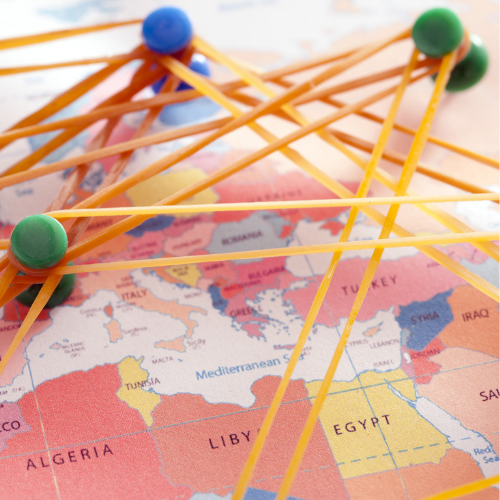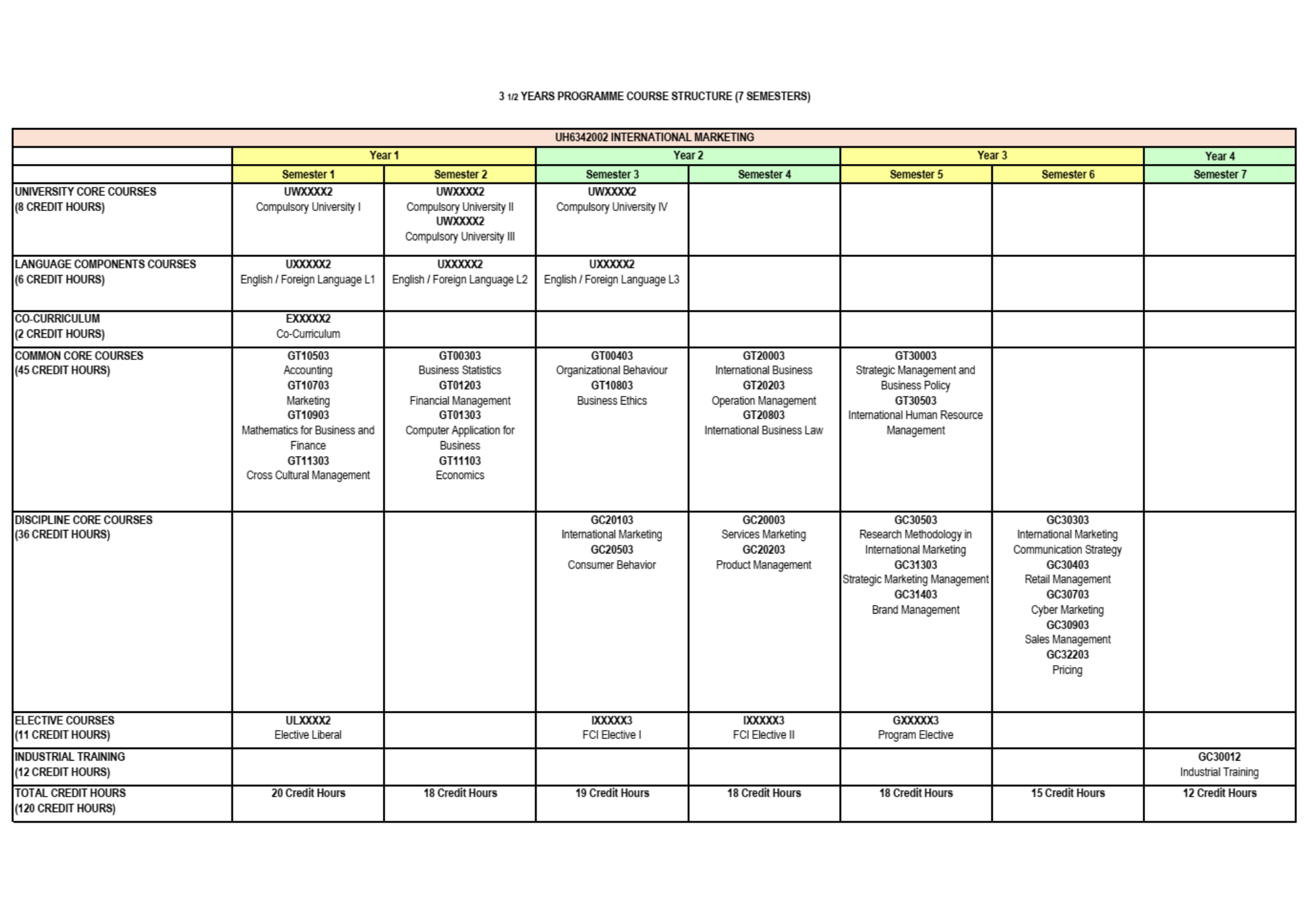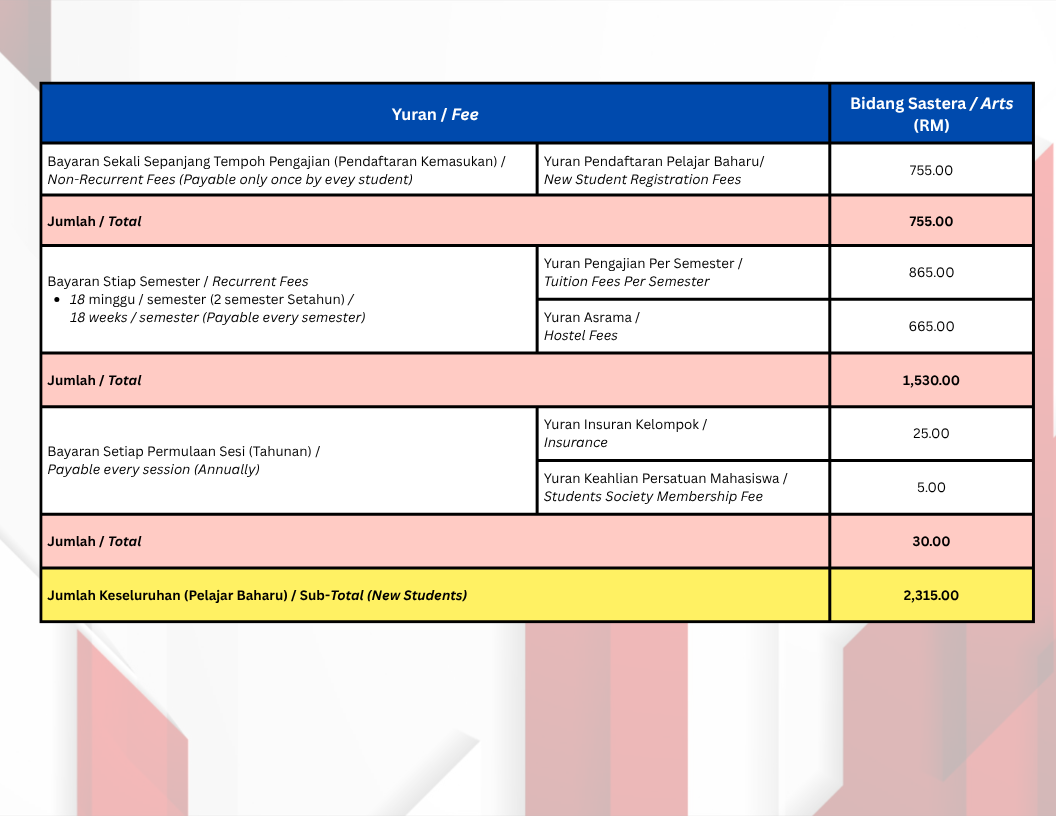Undergraduate Programme
UH6342002 - International Marketing

Programme & Code
Bachelor of International Marketing With Honours
UH6342002
Mode & Duration of Study
Full Time
7 Semesters (3.5 Years)
7 Semesters (3.5 Years)
MQA Reference Number
MQA/FA10953
Programme Info
This programme is developed to expose students to international marketing and the activities involved when marketing goods and services internationally. The teaching and learning focuses on the application of international marketing management. Among the main subjects of the program are International Marketing Strategic Communication, Marketing Strategic Management, International Marketing, Brand Management and Cyber Marketing.
Programme Educational Objectives (PEOs) & Programme Learning Outcomes (PLOs)
PEO 1
Continuous Professional Development: Graduates of the programme pursue their personal development through contemporary (modern or new) knowledge, research, and involvement in professional bodies. (PLO1, PLO2, PLO3).
PEO 2
Organization and Societal: Graduates of the programme contributes to sustainable development through digital marketing technologies and data analysis to serve society's and the nation's needs. (PLO6, PLO7).
PEO 3
Professionalism: Graduates of the programme establishes themselves as working professionals in international marketing or related fields. (PLO4, PLO9, PLO10, PLO11).
PEO 4
Interpersonal and Intrapersonal skills: Graduates of the programme are equiped with interpersonal and intrapersonal skills through communication, teamwork, and leadership. (PLO5, PLO8).
PEO 3
Professionalism: Graduates of the programme establishes themselves as working professionals in international marketing or related fields. (PLO4, PLO9, PLO10, PLO11).
PEO 4
Interpersonal and Intrapersonal skills: Graduates of the programme are equiped with interpersonal and intrapersonal skills through communication, teamwork, and leadership. (PLO5, PLO8).
PLO 1 ⇒ To demonstrate knowledge and understanding, enabling the learners to relate to their prior knowledge in the course of learning or work as well as to expand to related fields in International Marketing which provides the basis for applications of all other learning outcomes. (Knowledge and Understanding).
PLO 2 ⇒ To utilize thinking or intellectual capabilities and the ability to apply knowledge and skills in International Marketing and demonstrating the capacity to develop levels of intellectual skills progressively begins from understanding, critical/creative thinking, assessment, and applying, analysing, problem solving as well as synthesizing to create new ideas, solutions, strategies or new practices. (Cognitive Skills)
PLO 3 ⇒ To apply general work and operational skills applicable in an International Marketing environment such as planning; organisational skills; selection of tools, materials, technology methods and procedures, while in study context, it may include study skills and preparations, undertaking procedures, scientific skills, designs, research and so forth. (Practical Skills)
PLO 4 ⇒To demonstrate a range of skills which, amongst others, include interactive communications; relationships and collaborative skills in managing relationships in teams and within the organisations; networking with people of different cultures; as well as social skills/etiquette. (Interpersonal Skills)
PLO 5 ⇒To deliver information/ideas/reports cogently and professionally in appropriate language. The communication must be effective and in appropriate forms, in various mediums, to a range of audiences and different situations. (Communication Skills)
PLO 6 ⇒To demonstrate the ability to use information/digital technologies to support work and studies. The skills include sourcing and storing information, processing data, using applications for problem-solving and communication, as well as ethics in applying digital skills. (Digital Skills)
PLO 7 ⇒To analyse data by using relevant numerical skills, basic mathematics, symbols, statistical techniques and to prepare a report with relevant conclusions. This includes expressing ideas and solutions using numerical or mathematical information. (Numeracy Skills)
PLO 8 ⇒To demonstrate the ability to build relationships and work with teams made up of peers or in managerial capacities with varying degrees of autonomy to make decisions or set goals at organisational/unit/team levels; to take responsibilities and provide accountability; to be confident, knowledgeable, articulate, honest, professional, concerned, resilient, a risk taker and possess other intrapersonal skills including working in, and leading teams. (Leadership, autonomy and responsibility)
PLO 9 ⇒ To apply life skills portrayed through enthusiasm for independent learning, intellectual and self-development; by demonstrating confidence, self-control; social skills and proper etiquette; and commitment to professionalism in the workplace. It also includes capability to plan for career development or further education. Aspects of character such as honesty, punctuality, time management, keeping to and maintaining deadlines that are important in a work environment are also important personal skills. (Personal Skills)
PLO 10 ⇒To practice relevant knowledge, skills and expertise in key areas of an enterprise. Important personal qualities will include creativity, perseverance, grit and drive. The drive to be an entrepreneur is set as personal skills but also requires the requisite of relevant knowledge, cognitive and functional skills. (Entrepreneurial Skills)
PLO 11 ⇒ To instill awareness/understanding and respect of ethical, social and cultural differences and issues that are important in the exercise of professional skills and responsibilities including integrity, professional conduct (professionalism), and standards of conduct. (Ethics and Professionalism)
PLO 4 ⇒To demonstrate a range of skills which, amongst others, include interactive communications; relationships and collaborative skills in managing relationships in teams and within the organisations; networking with people of different cultures; as well as social skills/etiquette. (Interpersonal Skills)
PLO 5 ⇒To deliver information/ideas/reports cogently and professionally in appropriate language. The communication must be effective and in appropriate forms, in various mediums, to a range of audiences and different situations. (Communication Skills)
PLO 6 ⇒To demonstrate the ability to use information/digital technologies to support work and studies. The skills include sourcing and storing information, processing data, using applications for problem-solving and communication, as well as ethics in applying digital skills. (Digital Skills)
PLO 7 ⇒To analyse data by using relevant numerical skills, basic mathematics, symbols, statistical techniques and to prepare a report with relevant conclusions. This includes expressing ideas and solutions using numerical or mathematical information. (Numeracy Skills)
PLO 8 ⇒To demonstrate the ability to build relationships and work with teams made up of peers or in managerial capacities with varying degrees of autonomy to make decisions or set goals at organisational/unit/team levels; to take responsibilities and provide accountability; to be confident, knowledgeable, articulate, honest, professional, concerned, resilient, a risk taker and possess other intrapersonal skills including working in, and leading teams. (Leadership, autonomy and responsibility)
PLO 9 ⇒ To apply life skills portrayed through enthusiasm for independent learning, intellectual and self-development; by demonstrating confidence, self-control; social skills and proper etiquette; and commitment to professionalism in the workplace. It also includes capability to plan for career development or further education. Aspects of character such as honesty, punctuality, time management, keeping to and maintaining deadlines that are important in a work environment are also important personal skills. (Personal Skills)
PLO 10 ⇒To practice relevant knowledge, skills and expertise in key areas of an enterprise. Important personal qualities will include creativity, perseverance, grit and drive. The drive to be an entrepreneur is set as personal skills but also requires the requisite of relevant knowledge, cognitive and functional skills. (Entrepreneurial Skills)
PLO 11 ⇒ To instill awareness/understanding and respect of ethical, social and cultural differences and issues that are important in the exercise of professional skills and responsibilities including integrity, professional conduct (professionalism), and standards of conduct. (Ethics and Professionalism)
Career Prospect
Admission Requirements

Programme Structure
Fee Structure
How To Apply
Contact





